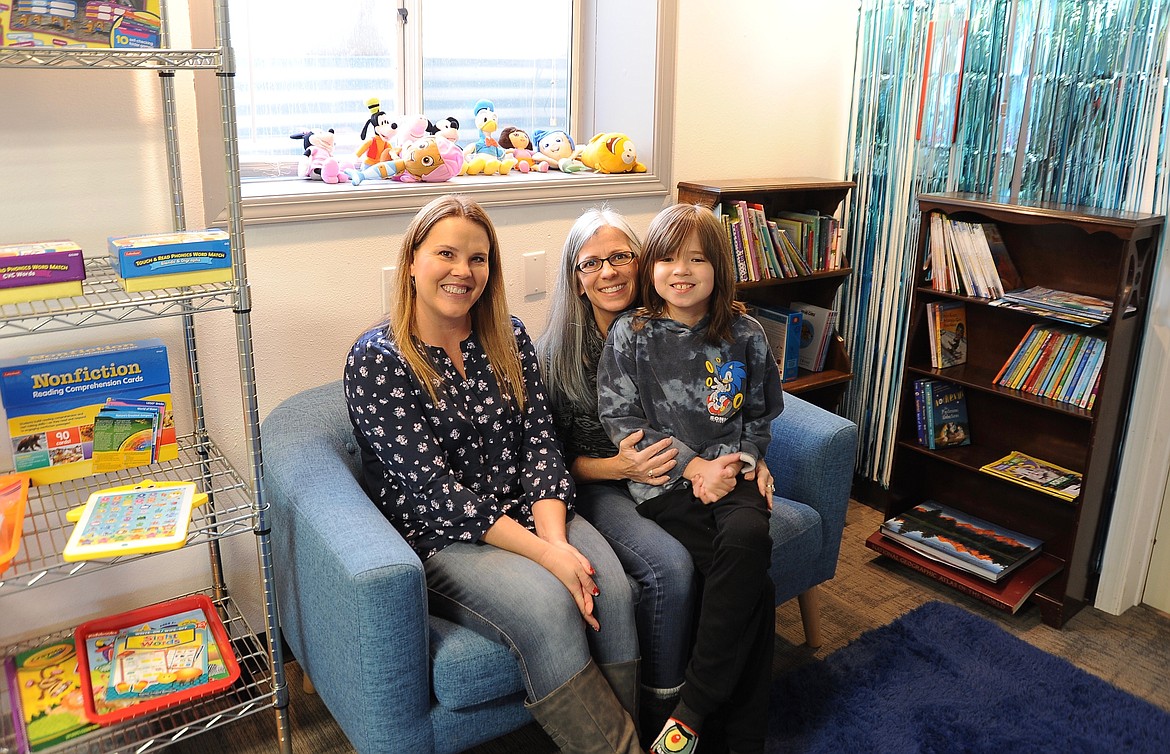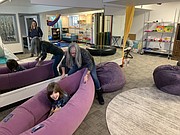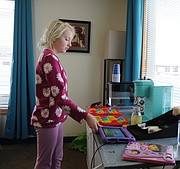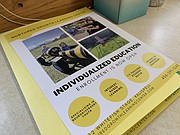Mom starts school to meet the needs of neurodivergent children
HILARY MATHESON | Hagadone News Network | UPDATED 3 years AGO
A new private school geared to neurodivergent learners has launched in Kalispell.
April Schottelkorb, founder of Rylee’s Play Place, a sensory gym, opened the Nurtured Growth Learning Center in October. Schottelkorb’s daughter, Rylee, who is autistic, is the inspiration for both endeavors and Schottelkorb’s background as a therapist specializing in child-centered play therapy is the foundation. Before going into private practice, Schottelkorb worked for years as a school counselor.
Many of the children she serves as a therapist are neurodivergent, and as in her personal experience, many were struggling in a traditional school setting whether public or private.
The word “neurodivergent” is not a medical term but is used to describe brain differences in how people process information, think, learn and behave, according to Harvard Health Publishing and clevelandclinic.org. This includes people on the autism spectrum, people with attention-deficit hyperactivity disorder (ADHD), Down syndrome and dyslexia, for example.
Rather than school being a place to thrive, the traditional classroom environment often became a source of frustration to children with sensory differences, which is what Schottelkorb and parent volunteer Cari Bowers, whose son Hawken has ADHD, experienced.
Schottelkorb understands public schools have limitations and operate within those limitations, which include state mandates, budgets and staffing shortages. Meeting all the needs of every student is a daunting task. While sensory rooms are becoming commonplace in elementary schools to help students to regulate their emotions, students can’t be in them all day.
“I feel for our schools,” Schottelkorb said. “Kids are so varied with so many different needs.”
While she said homeschooling is a great option, families do not always have the means to do it.
“A parent doesn’t always know what to do. Over the years, I just felt like there needs to be an alternative,” she said.
That alternative was starting the private school at 1322 Whitefish Stage Road in Kalispell in a building that was originally a house, giving it a homelike feel inside. The garage is where Rylee’s Play Place is located.
Recently, Schottelkorb visited the Cottonwood Day School in Bozeman to learn more about opening a school from scratch. Similar to the Nurtured Growth Learning Center, the Cottonwood Day School, which opened in 2014, was founded by a mother with a background in education and social work to meet the specific needs of children with learning challenges, according to cottonwooddayschool.org.
“She gets people from all over the western United States. There’s just not many options,” Schottelkorb said.
WEDNESDAY AFTERNOON, Bowers and her son Hawken were in the kitchen making chocolate chip cookies and sliding them into the oven, before going downstairs to give a tour. In the room adjacent to the kitchen, Rylee was intently listening to a song playing on a smartphone. On the way to the stairs, Hawken made a beeline to a mini trampoline to jump.
The downstairs is spacious and features different sensory furniture/play equipment such as balance balls, wobble stools and bean bags as well as wall-length mirrors, educational games, books, materials and computers.
Schottelkorbs' goal is to provide a learning environment adapted to students’ physical, social-emotional and academic needs and interests versus the other way around. Schottelkorb plans to achieve this by maintaining a one-to-three student-to-teacher ratio. She also incorporated the child-centered play therapy philosophy, “which views all children as capable of growth and development when specific environmental conditions of unconditional acceptance, genuine caring and empathic understanding are in place,” Schottelkorb said.
“When students feel cared for and safe, and their specific needs and desires are valued and respected, they can learn,” she said.
Learning is student-centered, which means students direct their learning, work at their own pace and teachers take on the role of facilitator — a concept grounded in the Montessori philosophy.
Learning takes place through traditional ways and curriculum, and alternative methods such as play, games or experiences like cooking. In addition to academics, students also learn life skills to foster independence.
Schottelkorb said her daughter is really into technology so she’s incorporated a lot of game-based learning.
“It’s what she enjoys and how she learns best,” Schottelkorb said.
For Bower’s son, math and science are his favorite subjects.
School in session four days a week, versus five days. The school day may be up to six hours long, though it may be shortened depending on the needs. Hawken currently attends a shortened school day, which frees up time for him to receive beneficial therapies such as occupational therapy. Bowers said she has seen a marked improvement in her son’s well-being
BOWERS MET Schottelkorb years ago when looking for a play therapist for her son. When Schottelkorb mentioned she was opening a school, Bowers was intrigued. Her son started kindergarten in 2020, the first year of the Covid-19 pandemic, which not only had a huge impact on the way schools operated but also exacerbated the teacher shortages, which included an ongoing shortage of special education staff.
“They had a hard time keeping staffing levels up then and staffing levels now are even worse,” Bowers said. “My son is supposed to have an aide all day long at school but [the school he attended was] never able to give that to him. He had an aide for part of the day but he needed more support than that. I ended up getting phone calls during the week. More things were happening at school.”
“Instead of fighting the system, I wanted to find something for him. A much easier place for him to learn where he could get up and jump around if he needed to move,” Bowers added.
Enrollment is small at the center and she said her son misses the social aspect of being with more peers, but she is hoping to make up for that through extracurricular activities.
A shorter school day combined with self-directed learning has been a good combination so far.
“Pushing him through an entire school day, with his disability, opens up room for behavior issues and boredom,” she said. “He’s a much happier kid. We don’t have the same anger issues.”
“We made the right decision,” Bowers said.
Currently, the nonprofit center is seeking to raise funding to hire a part-time teacher and establish a scholarship program for students who cannot afford to pay tuition. A GoFundMe has been set up with a $30,000 goal. People may also donate through the center website www.nurturedgrowthlearningcenter.com.
Schottelkorb is excited to find a like-minded teacher.
“We want to emphasize the relationship. It’s also fundamental that a kid has to feel safe and regulated. It requires a different mindset than traditional schools have,” she said.
Schottelkorb has planned a series of free workshops open to the public that will be held in person and online. She said the workshops are meant to inform and explore the strengths, abilities and needs of children with different developmental, sensory and learning disorders in addition to connecting families.
Informing the public is important Schottelkorb. Neurodivergence isn’t always visible like a physical disability might be and Schottelkorb knows all too well the stares and comments it can garner while out in public from people who don’t understand.
“I would love to change the world,” she said.
Until then, she’s starting at the local level.
“That’s why I started a sensory gym. So [Rylee] could play without judgment and that’s why I started this school,” she said.
Reporter Hilary Matheson may be reached at 758-4431 or [email protected].
If you go
What: A series of in-person/virtual workshops Please RSVP at [email protected] and indicate if you will be attending in person or remotely to receive a Zoom link prior to the event
Where: 1322 Whitefish Stage, Kalispell, MT 59901
When: 5:30 to 6:30 p.m.
— Dec. 15: The Neurodivergent Mind
— Jan. 19: Autism
— Feb. 16: Attention-Deficit Hyperactivity Disorder (ADHD)
— March 16: Dyslexia, dyscalculia, dysgraphia, dyspraxia
— April 20: Sensory processing differences
— May 18: To be determined
Why: To connect families while educating and exploring the strengths, abilities and needs of children with different developmental, sensory and learning disorders.
ARTICLES BY HILARY MATHESON

Christmas tradition: Business continues helping customers capture the holiday spirit
Snowline Acres owners Tom and Kristin Davis are approaching a decade of helping people celebrate the most wonderful time of the year.
Whitefish High School wins East Helena speech and debate tournament
Scoring 225 points, the Whitefish High School speech and debate team took first place at a weekend tournament.

Glacier High speech and debate team secures second in Bozeman
The Glacier High School speech and debate team secured second place, and Flathead High School, third in Bozeman.




